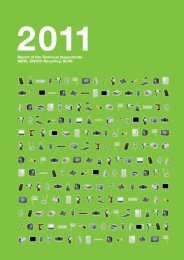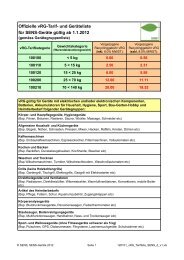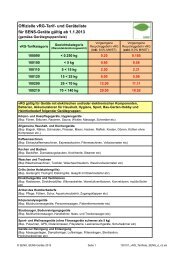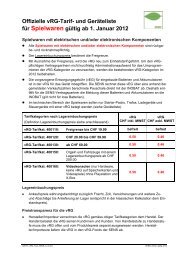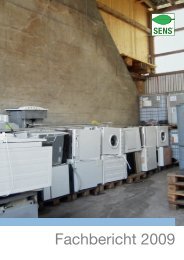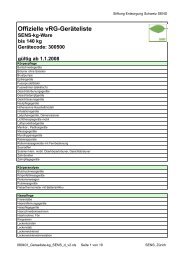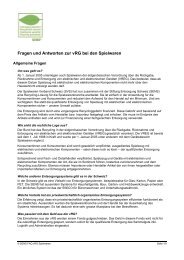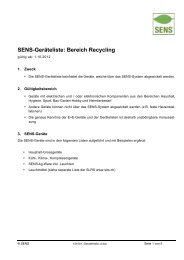Annual Report - Sens
Annual Report - Sens
Annual Report - Sens
You also want an ePaper? Increase the reach of your titles
YUMPU automatically turns print PDFs into web optimized ePapers that Google loves.
Collection points<br />
Economic efficiency:<br />
more efficient collection<br />
Collecting electrical and electronic appliances is the cornerstone of all the areas in<br />
which SENS operates. A survey on the costs of the SENS collection points has enabled<br />
SENS to achieve a sound basis for developing more appropriate collection point<br />
remunerations in 2011.<br />
Private individuals can return their electrical and electronic<br />
appliances free of charge at the numerous SENS collection<br />
points. Returning them to these points guarantees they will<br />
be recycled in a regulated, environmentally appropriate and<br />
profes sional way in the SENS recycling and disposal system.<br />
In turn the collection points are remunerated for receiving, storing<br />
and transporting the electrical and electronic appliances.<br />
The remun eration rate is reviewed annually.<br />
Sufficient remuneration<br />
The collection points are some of SENS’ most important<br />
partners. To reassess the essential services of the collection<br />
points, taking into account their different requirements – size,<br />
location, organisational structure, quantity of goods collected,<br />
etc. – more appropriately, SENS conducted a survey of collection<br />
point costs in 2011.<br />
Survey on collection point costs<br />
To collect data, SENS sent out questionnaires to a random<br />
selection of half of the existing SENS collection points. Out of<br />
225 questionnaires 123 were returned: a satisfying response<br />
rate of more than 50 per cent. In the first part of the questionnaire<br />
those collection points taking part answered questions on<br />
general points, such as location, opening times, organisational<br />
structure, etc. In the second part they gave information on their<br />
current approaches to remuneration, the services they offered,<br />
space requirements and time taken to receive and store the<br />
appliances, employee wages and cost of the operating area<br />
per square metre. SENS is currently working on a detailed<br />
evaluation of the data.<br />
The intention is to re-evaluate the importance of the collection<br />
points, both within the network of partners and in terms of how<br />
end customers perceive them, by fundamentally revising and<br />
redefining the remuneration model on the basis of the survey<br />
results. Above-average performance and quality, especially<br />
regarding enhanced attractiveness for end customers, should be<br />
financially rewarded. Hence factors such as customer ser vice,<br />
provision of support, opening times, cleanliness, orderliness<br />
20 SENS <strong>Annual</strong> <strong>Report</strong> 2011<br />
and structure, data quality and the question of how up to date<br />
the collection points are in terms of remuneration are taken into<br />
account. The process of introducing the new remuneration<br />
model, in which representatives from the collection points are<br />
participating, is due to be completed in 2013.<br />
Initial results of the survey on collection point costs<br />
The distribution of the SENS collection points according to turnover<br />
shows that around a third of the collection points collects a relatively<br />
small quantity of SENS goods. This segment poses the greatest<br />
challenge in terms of optimisation. Moreover, the results of the survey<br />
indicate that with collection points above a certain size, the selection<br />
of types of containers used, e.g. containers or pallets, influences turnover.<br />
Investigations also reveal that there may be potential for improvement<br />
at the interfaces between collection points and transport<br />
companies. Collection points which do not transport the goods<br />
themselves often carry out preliminary work that is in fact the responsibility<br />
of the transport companies.



